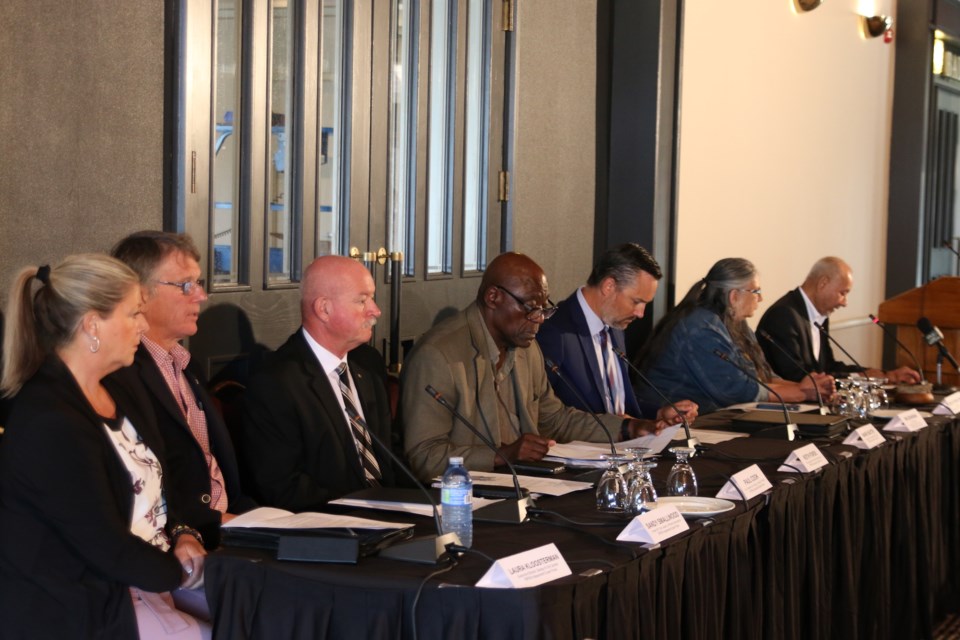THUNDER BAY — The latest report examining policing in the city of Thunder Bay says transformational change is needed in the service and board and it is needed now.
“We have concluded that meaningful change requires bold leadership and bold action for a comprehensive, systemic process of organizational transformation, with the Board and the Chief of Police working together and in close consultation with the community, especially Indigenous peoples, and communities,” reads the final report prepared by the expert panel appointed by the Thunder Bay Police Services Board.
The expert panel’s final report, Building Trust Through Bold Action: Roadmap for Real Change, was released on Thursday and includes 10 action proposals directed at the Thunder Bay Police Service and its oversight board.
The proposed actions relate to issues of racism, inclusion, trauma-informed policing, and ongoing consultation and engagement with Indigenous people and First Nation leaders, community organizations, and police services.
There are also calls for stronger and more transparent implementation of recommendations from previous reports including the Office of the Independent Police Review Director’s 2018 Broken Trust report and Senator Murray Sinclair’s 2019 report.
“There is no shortage of ideas or advice. By our count, the reports summarized above offer more than 550 recommendations with varying degrees of implementation and success,” the report reads.
“We want to be clear that not every delay in acting on the recommendations is due to a structural hurdle. There are many that have yet to be carried out because of a lack of accountability and willful blindness by institutional bodies that must take ownership to create change.”
The report goes on to state that the implementation of recommendations for the Broken Trust report can only be described as “uneven,” and that there is an absence of “verifiable evidence of the degree to which a recommendation has been or is being carried out.”
“We were warned during consultations that there could soon be a Broken Trust 2.0 caused by growing caseloads because of the state of violent crime in Thunder Bay,” the report reads.
“This, paired with a lack of resources, which contribute to challenges related to training, mentorship, succession planning and knowledge transfer protocols, creates cause for concern over the ability of officers to have the necessary support to complete quality investigations.”
The report was equally critical of progress on implementing recommendations from Sinclair’s report, saying the police services board only made “marginal material progress.”
“Our view of the matter, which is based on our extensive reviews and consultations, is that the response of the Service and the Board has, at best, consisted of half-hearted and sporadic measures to act on the many good ideas that were proposed,” the report states. “At worst, there have been claims of action that are unsustainable, based on results.”
Action proposals directed at the police services board include completion of training, taking responsibility for labour relations and workplace health and safety, and setting annual performance goals for chief of police and senior command.
The expert panel is also recommending the chief of police develop a leadership succession plan, establish an ombudsman's office, review workplace morale, take a proactive approach to mental health and wellness of members, conduct an external review of cases involving members denied promotions on multiple occasions, and engage an external expert to conduct a review of the use of the disciplinary process such as Police Service Act charges.
“We cannot emphasize enough the need to immediately address festering internal problems around labour relations,” the report stated.
“Past employee surveys show that morale is low and that too many staff feel they have been treated unfairly in terms of the handling of their health and wellbeing needs, their treatment in the workplace, their career prospects and managing ever-growing workloads due to rates of violent crime in the city.”
More general action proposals are directed at various stakeholders and include community groups, First Nations, and government leaders working together to reverse the decision to suspend autopsies being performed at the Thunder Bay Regional Health Sciences Centre, that the Ontario Civilian Police Commission conduct regular monitoring of the implementation of past recommendations, and that the OIPRD follow through on the recommendation to report publicly on the Police Services implementing recommendations from the Broken Trust report.
“It should be made clear that these proposals are not an alternative to the recommendations from the Coroner’s inquests, the Sinclair report and the OIPRD’s ‘Broken Trust’ report,” the report reads.
“The actions we propose are based on our conclusions that issues of systemic racism, mental health, human rights, and workplace culture need to be dealt with using a ‘whole-of-system’ approach. That is, an effective response needs to be comprehensive, organizational, and systemic.”
The expert panel was convened last spring by the police services board to review mental health and human rights related concerns raised by members of the police service, review the progress on past recommendations, and review policies, procedures, and training within the board and police service.
An interim report was released last September with several pressing recommendations, including actions to be taken in the hiring process for a new chief of police.
As part of the report, the panel conducted both public and private consultations throughout 2022, meeting with more than 100 organizations and individuals, as well as holding two public consultation sessions.
The expert panel acknowledged that many people in Thunder Bay, particularly Indigenous people, are tired of receiving reports looking into policing in city and want to see action.
“We understand this frustration and have purposefully crafted our final report to demonstrate in the strongest language, that change is needed,” the report reads. “Policing is a constantly evolving profession that requires open and honest scrutiny both internally and externally. It is how we will all move forward with compassion, confidence, and trust.”
The Thunder Bay Police Services Board is meeting Thursday evening at 5:30 p.m. to discuss the findings of the report.
